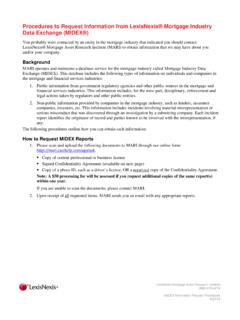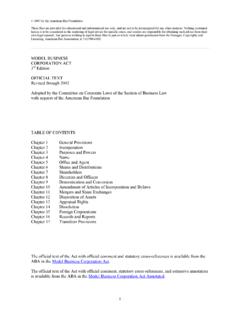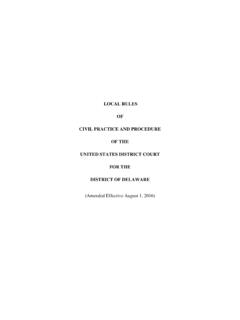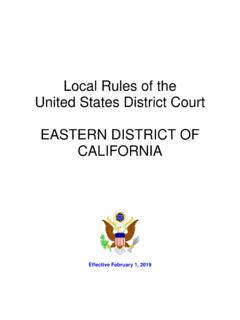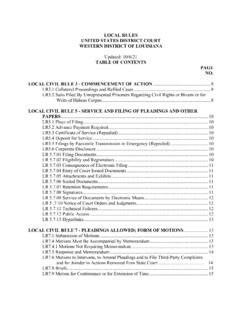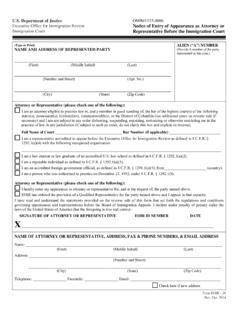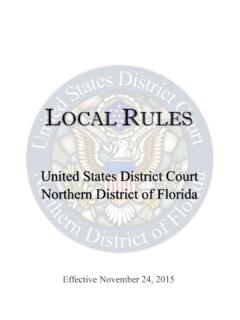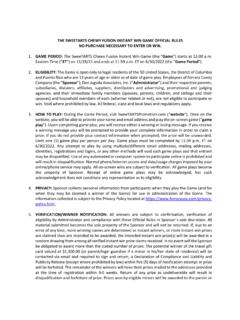Transcription of 2021 Federal Rules of Civil Procedure
1 2021 Federal Rules of Civil Procedure Compliments of Federal Rules OF Civil Procedure . I. SCOPE OF Rules ; FORM OF ACTION 1. Rule 1. Scope and Purpose 1. Rule 2. One Form of Action 1. II. COMMENCING AN ACTION; SERVICE. OF PROCESS, PLEADINGS, MOTIONS, AND ORDERS 1. Rule 3. Commencing an Action 1. Rule 4. Summons 1. Rule Serving Other Process 13. Rule 5. Serving and Filing Pleadings and Other Papers 14. Rule Constitutional Challenge to a Statute Notice, Certification, and Intervention 18. Rule Privacy Protection For Filings Made with the court 19. Rule 6. Computing and Extending Time; Time for Motion Papers 23. III. PLEADINGS AND MOTIONS 24. Rule 7. Pleadings Allowed; Form of Motions and Other Papers 24. Rule Disclosure Statement 25. Rule 8. General Rules of Pleading 25. Rule 9. Pleading Special Matters 28. Rule 10. Form of Pleadings 30. Rule 11. Signing Pleadings, Motions, and Other Papers;. Representations to the court ; Sanctions 30. Federal Rules of Civil Procedure Rule 12. Defenses and Objections: When and How Presented; Motion for Judgment on the Pleadings; Consolidating Motions; Waiving Defenses; Pretrial Hearing 33.
2 Rule 13. Counterclaim and Crossclaim 37. Rule 14. Third-Party Practice 39. Rule 15. Amended and Supplemental Pleadings 41. Rule 16. Pretrial Conferences; Scheduling; Management 43. IV. PARTIES 48. Rule 17. Plaintiff and Defendant; Capacity;. Public Officers 48. Rule 18. Joinder of Claims 50. Rule 19. Required Joinder of Parties 50. Rule 20. Permissive Joinder of Parties 52. Rule 21. Misjoinder and Nonjoinder of Parties 53. Rule 22. Interpleader 53. Rule 23. Class Actions 54. Rule Derivative Actions 62. Rule Actions Relating to Unincorporated Associations 63. Rule 24. Intervention 63. Rule 25. Substitution of Parties 65. V. DISCLOSURES AND DISCOVERY 66. Rule 26. Duty to Disclose; General Provisions Governing Discovery 66. Rule 27. Depositions to Perpetuate Testimony 82. Rule 28. Persons Before Whom Depositions May Be Taken 85. Compliments of Rule 29. Stipulations About Discovery Procedure 87. Rule 30. Depositions by Oral Examination 87. Rule 31. Depositions by Written Questions 95.
3 Rule 32. Using Depositions in court Proceedings 97. Rule 33. Interrogatories to Parties 101. Rule 34. Producing Documents, Electronically Stored Information, and Tangible Things, or Entering onto Land, for Inspection and Other Purposes 102. Rule 35. Physical and Mental Examinations 105. Rule 36. Requests for Admission 107. Rule 37. Failure to Make Disclosures or to Cooperate in Discovery; Sanctions 109. VI. TRIALS 116. Rule 38. Right to a Jury Trial; Demand 116. Rule 39. Trial by Jury or by the court 117. Rule 40. Scheduling Cases for Trial 117. Rule 41. Dismissal of Actions 118. Rule 42. Consolidation; Separate Trials 119. Rule 43. Taking Testimony 120. Rule 44. Proving an Official Record 120. Rule Determining Foreign Law 122. Rule 45. Subpoena 123. Rule 46. Objecting to a Ruling or Order 130. Rule 47. Selecting Jurors 131. Rule 48. Number of Jurors; Verdict; Polling 131. Rule 49. Special Verdict; General Verdict and Questions 132. Federal Rules of Civil Procedure Rule 50. Judgment as a Matter of Law in a Jury Trial.
4 Related Motion for a New Trial;. Conditional Ruling 133. Rule 51. Instructions to the Jury; Objections;. Preserving a Claim of Error 135. Rule 52. Findings and Conclusions by the court ;. Judgment on Partial Findings 137. Rule 53. Masters 139. VII. JUDGMENT 143. Rule 54. Judgment; Costs 143. Rule 55. Default; Default Judgment 145. Rule 56. Summary Judgment 146. Rule 57. Declaratory Judgment 149. Rule 58. Entering Judgment 149. Rule 59. New Trial; Altering or Amending a Judgment 151. Rule 60. Relief from a Judgment or Order 152. Rule 61. Harmless Error 153. Rule 62. Stay of Proceedings to Enforce a Judgment 154. Rule Indicative Ruling on a Motion for Relief That is Barred by a Pending Appeal 156. Rule 63. Judge's Inability to Proceed 156. VIII. PROVISIONAL AND FINAL REMEDIES 157. Rule 64. Seizing a Person or Property 157. Rule 65. Injunctions and Restraining Orders 157. Rule Proceedings Against a Surety 160. Rule 66. Receivers 160. Rule 67. Deposit into court 161. Compliments of Rule 68.
5 Offer of Judgment 161. Rule 69. Execution 162. Rule 70. Enforcing a Judgment for a Specific Act 163. Rule 71. Enforcing Relief For or Against a Nonparty 163. IX. SPECIAL PROCEEDINGS 164. Rule Condemning Real or Personal Property 164. Rule 72. Magistrate Judges: Pretrial Order 172. Rule 73. Magistrate Judges: Trial by Consent; Appeal 173. Rule 74. [Abrogated.] 174. Rule 75. [Abrogated.] 174. Rule 76. [Abrogated.] 174. X. district COURTS AND CLERKS: CONDUCTING BUSINESS; ISSUING ORDERS 174. Rule 77. Conducting Business; Clerk's Authority;. Notice of an Order or Judgment 174. Rule 78. Hearing Motions; Submission on Briefs 176. Rule 79. Records Kept by the Clerk 176. Rule 80. Stenographic Transcript as Evidence 177. XI. GENERAL PROVISIONS 178. Rule 81. Applicability of the Rules in General;. Removed Actions 178. Rule 82. Jurisdiction and Venue Unaffected 181. Rule 83. Rules by district Courts; Judge's Directives 181. Rule 84. [Abrogated.] 182. Rule 85. Title 182. Rule 86. Effective Dates 182.
6 Federal Rules of Civil Procedure Compliments of Federal Rules OF Civil Procedure . I. SCOPE OF Rules ; FORM OF ACTION. Rule 1. Scope and Purpose These Rules govern the Procedure in all Civil actions and proceedings in the united states district courts, except as stated in Rule 81. They should be construed, administered, and employed by the court and the parties to secure the just, speedy, and inexpensive determination of every action and proceeding. Rule 2. One Form of Action There is one form of action the Civil action. II. COMMENCING AN ACTION; SERVICE OF PROCESS, PLEADINGS, MOTIONS, AND ORDERS. Rule 3. Commencing an Action A Civil action is commenced by filing a complaint with the court . Rule 4. Summons (a) Contents; Amendments. ( 1 ) Contents. A summons must: (A) name the court and the parties;. (B) be directed to the defendant;. (C) state the name and address of the plaintiff's attorney or if unrepresented of the plaintiff;. (D) state the time within which the defendant must appear and defend.
7 (E) notify the defendant that a failure to appear and defend will result in a default judgment against the defendant for the relief demanded in the complaint;. 1. Federal Rules of Civil Procedure (F) be signed by the clerk; and (G) bear the court 's seal. (2) Amendments. The court may permit a summons to be amended. (b) Issuance. On or after filing the complaint, the plaintiff may present a summons to the clerk for signature and seal. If the summons is properly completed, the clerk must sign, seal, and issue it to the plaintiff for service on the defendant. A summons or a copy of a summons that is addressed to multiple defendants must be issued for each defendant to be served. (c) Service. ( 1 ) In General. A summons must be served with a copy of the complaint. The plaintiff is responsible for having the summons and complaint served within the time allowed by Rule 4(m) and must furnish the necessary copies to the person who makes service. (2) By Whom. Any person who is at least 18 years old and not a party may serve a summons and complaint.
8 (3) By a Marshal or Someone Specially Appointed. At the plaintiff's request, the court may order that service be made by a united states marshal or deputy marshal or by a person specially appointed by the court . The court must so order if the plaintiff is authorized to proceed in forma pauperis under 28 1915 or as a seaman under 28 1916. (d) Waiving Service. ( 1 ) Requesting a Waiver. An individual, corporation, or association that is subject to service under Rule 4(e), (f), or (h) has a duty to avoid unnecessary expenses of serving the summons. The plaintiff may notify such a defendant that an action has been commenced and request that the defendant waive service of a summons. 2. Compliments of The notice and request must: (A) be in writing and be addressed: (i) to the individual defendant; or (i i) for a defendant subject to service under Rule 4(h), to an officer, a managing or general agent, or any other agent authorized by appointment or by law to receive service of process.
9 (B) name the court where the complaint was filed;. (C) be accompanied by a copy of the complaint, 2. copies of the waiver form appended to this Rule 4, and a prepaid means for returning the form;. (D) inform the defendant, using the form appended to this Rule 4, of the consequences of waiving and not waiving service;. (E) state the date when the request is sent;. (F) give the defendant a reasonable time of at least 30 days after the request was sent or at least 60. days if sent to the defendant outside any judicial district of the united states to return the waiver;. and (G) be sent by first-class mail or other reliable means. (2) Failure to Waive. If a defendant located within the united states fails, without good cause, to sign and return a waiver requested by a plaintiff located within the united states , the court must impose on the defendant: (A) the expenses later incurred in making service; and (B) the reasonable expenses, including attorney's fees, of any motion required to collect those service expenses.
10 (3) Time to Answer After a Waiver. A defendant who, before being served with process, timely returns a 3. Federal Rules of Civil Procedure waiver need not serve an answer to the complaint until 60 days after the request was sent or until 90 days after it was sent to the defendant outside any judicial district of the united states . (4) Results of Filing a Waiver. When the plaintiff files a waiver, proof of service is not required and these Rules apply as if a summons and complaint had been served at the time of filing the waiver. (5) Jurisdiction and Venue Not Waived. Waiving service of a summons does not waive any objection to personal jurisdiction or to venue. (e) Serving an Individual Within a Judicial district of the united states . Unless Federal law provides otherwise, an individual other than a minor, an incompetent person, or a person whose waiver has been filed may be served in a judicial district of the united states by: ( 1 ) following state law for serving a summons in an action brought in courts of general jurisdiction in the state where the district court is located or where service is made; or (2) doing any of the following: (A) delivering a copy of the summons and of the complaint to the individual personally.



